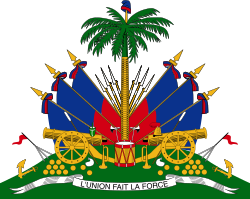 |
|---|
This article lists the prime ministers of Haiti since the establishment of the office of Prime Minister of Haiti in 1988.
 |
|---|
This article lists the prime ministers of Haiti since the establishment of the office of Prime Minister of Haiti in 1988.
| No. | Portrait | Name (Birth–Death) | Election | Term of office | Political party | President (Term) | |||
|---|---|---|---|---|---|---|---|---|---|
| Took office | Left office | Time in office | |||||||
| 1 |  | Martial Célestin (1913–2011) | 1988 | 9 February 1988 | 20 June 1988 (Deposed) | 132 days | Independent | Leslie Manigat  (1988) | |
| Post vacant (20 June 1988 – 13 February 1991) | |||||||||
| 2 | 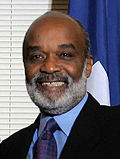 | René Préval (1943–2017) | 1990–91 | 13 February 1991 | 11 October 1991 (Deposed) | 240 days | Struggling People's Organization | Jean-Bertrand Aristide  (1991) | |
| 3 |  | Jean-Jacques Honorat (1931–2023) | — | 11 October 1991 | 19 June 1992 | 252 days | Independent | Joseph Nérette  (1991–1992) | |
| 4 |  | Marc Bazin (1932–2010) | — | 19 June 1992 | 30 August 1993 | 1 year, 72 days | Movement for the Instauration of Democracy in Haiti | Marc Bazin  (1992–1993) | |
| 5 |  | Robert Malval (born 1943) | 1993 | 30 August 1993 | 8 November 1994 | 1 year, 70 days | Independent | Émile Jonassaint  (1993–1994) | |
| 6 |  | Smarck Michel (1937–2012) | — | 8 November 1994 | 7 November 1995 | 364 days | Struggling People's Organization | Jean-Bertrand Aristide  (1994–1996) | |
| 7 |  | Claudette Werleigh (born 1946) | 1995 | 7 November 1995 | 27 February 1996 | 112 days | Struggling People's Organization | ||
| 8 |  | Rosny Smarth (1940–2025) | — | 27 February 1996 | 20 October 1997 | 1 year, 235 days | Struggling People's Organization | René Préval  (1996–2001) | |
| Post vacant (20 October 1997 – 26 March 1999) | |||||||||
| 9 |  | Jacques-Édouard Alexis (born 1947) | — | 26 March 1999 | 2 March 2001 | 1 year, 341 days | Fanmi Lavalas | ||
| 10 |  | Jean Marie Chérestal (born 1947) | 2000 | 2 March 2001 | 15 March 2002 | 1 year, 13 days | Fanmi Lavalas | Jean-Bertrand Aristide  (2001–2004) | |
| 11 |  | Yvon Neptune (born 1946) | — | 15 March 2002 | 12 March 2004 (Deposed) | 1 year, 363 days | Fanmi Lavalas | ||
| 12 | 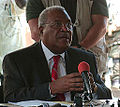 | Gérard Latortue (1934–2023) | — | 12 March 2004 | 9 June 2006 | 2 years, 89 days | Independent | Boniface Alexandre  (2004–2006) | |
| (9) |  | Jacques-Édouard Alexis (born 1947) | 2006 | 9 June 2006 | 5 September 2008 | 2 years, 88 days | Lespwa | René Préval  (2006–2011) | |
| 13 |  | Michèle Pierre-Louis (born 1947) | — | 5 September 2008 | 11 November 2009 | 1 year, 67 days | Independent | ||
| 14 |  | Jean-Max Bellerive (born 1958) | — | 11 November 2009 | 18 October 2011 | 1 year, 341 days | Lespwa | ||
| 15 |  | Garry Conille (born 1966) | 2010–11 | 18 October 2011 | 16 May 2012 | 211 days | Independent | Michel Martelly  (2011–2016) | |
| 16 |  | Laurent Lamothe (born 1972) | — | 16 May 2012 | 20 December 2014 | 2 years, 218 days | Independent | ||
| — |  | Florence Duperval Guillaume | — | 20 December 2014 | 16 January 2015 | 27 days | Independent | ||
| 17 | 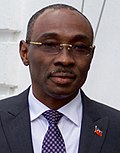 | Evans Paul (born 1955) | — | 16 January 2015 | 26 February 2016 | 1 year, 41 days | Democratic Alliance Party | ||
| 18 |  | Fritz Jean (born 1956) | 2015–16 | 26 February 2016 | 28 March 2016 | 31 days | Inite | Jocelerme Privert  (2016–2017) | |
| 19 |  | Enex Jean-Charles (born 1960) | — | 28 March 2016 | 21 March 2017 | 358 days | Independent | ||
| 20 | 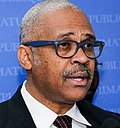 | Jack Guy Lafontant (born 1961) | — | 21 March 2017 | 17 September 2018 | 1 year, 180 days | Democratic Movement of Haiti – Democratic Rally of Haiti [1] | Jovenel Moïse  (2017–2021) | |
| 21 |  | Jean-Henry Céant (born 1956) | — | 17 September 2018 | 21 March 2019 | 185 days | Renmen Ayiti [2] | ||
| — |  | Jean-Michel Lapin (born 1967) | — | 21 March 2019 | 4 March 2020 | 349 days | Independent | ||
| 22 |  | Joseph Jouthe (born 1961) | — | 4 March 2020 | 13 April 2021 | 1 year, 40 days | Independent | ||
| — |  | Claude Joseph | — | 14 April 2021 | 20 July 2021 [a] | 97 days | Independent | ||
| — |  | Ariel Henry (born 1949) | — | 20 July 2021 | 24 April 2024 [3] | 2 years, 279 days | Independent | Position vacant (2021–2024) | |
| — |  | Michel Patrick Boisvert | — | 25 February 2024 | 3 June 2024 | 99 days [b] | Independent | ||
| — |  | Garry Conille (born 1966) | — | 3 June 2024 | 10 November 2024 | 160 days | Independent | Transitional Presidential Council (2024) | |
| — |  | Alix Didier Fils-Aimé (born 1971) | — | 10 November 2024 | Incumbent | 322 days | Independent | ||
